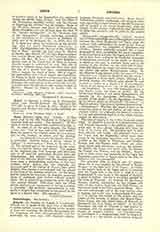

Assur (Sept., Assour). (I) The name used in the Old Testament to designate the Assyrian land and nation. (See Assyria.) (2) The name of one of the sons of Sem, mentioned in Gen., x, 22. In verse 11 of the same chapter, the Douay version has: “Out of that land came forth Assur”. Here the name in the original refers not to a person, but to the country, as above, and the reading: “…he (Nimrod) went forth into Assyria (Assur)” is preferable. Another Assur, or Ashur, “father of Thecua”, is mentioned in I Paral., ii, 24, and iv, 5. (3) The national god of the Assyrians (in the cuneiform inscriptions Asshur and Ashur). The religion of the Assyrians, like their language and their arts, was in all essential particulars derived from the Babylonians. But together with the preponderance of the Assyrian power over the southern provinces came a corresponding exaltation of the local tutelary deity. Asshur, who was originally the eponymic god of the capital of Assyria (also called Asshur), thus became a national god, and was placed at the head of the Assyrian pantheon. In his name, and to promote his interests, the Assyrian monarchs claim to undertake their various military expeditions. He is styled King among the gods; the god who created himself. Differently from the other deities, Asshur is not represented as having a consort or posterity. His symbolic representation is ordinarily a winged disc, sometimes accompanied by the figure of a human bust. (See Assyria.)

